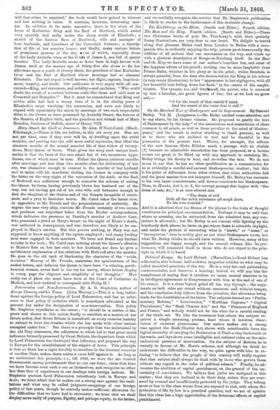Mary Stuart, ker Guilt or Innocence. By Alex. M'Neel - Caird. (Black
: Edinburgh.)--There is life, we believe, in this old story yet. Men are not yet tired, even if they ever will be, of dwelling upon the awful ssalities, and peering into the still more awful mysteries, that filled the nineteen months of the second married life of that widow of twenty- three, Mary Queen of Scots. What gives the story such unique fasci- nation is that the facts of the case admit but of two monstrous hypo- theses, one of which must he true. Either the Queen nineteen months after marriage, and less than two months after the christening of her son, was shameless enough to consent to the murder of her husband and to union with his murderer, visiting the former in company with 'the latter on the very night of 'the execution of the deed ; or the Earl of Bothwell was audacious enough to conceive the scheme of seizing the 'Queen by force, having previously blown her husband out of the way, but not having got rid of his own-wife, and fortunate enough to fmd the daughter of the Guises and of the Stuarts incapable of resist-' anee, and a prey to feminine terror. Mr. Caird takes the latter view„, in opposition to Mr. Fronde and the preponderance of authority. He I agues the case very ably, convicts Mr. Fronde certainly of two errors, and produces one important letter from the Border correspondence, which indicates the presence at Darnley's murder of Andrew Carr, who presented a pistol at Mary's breast on the night of Rizzio's death, was outlawed in consequence, and was therefore not likely to be em- ployed in Mary's service. But this proves nething, as Mary was not supposed to know anything of the agents employed ; and many loading' men were engaged in both murders. We have net found any further novelty in the book ; Mr. Caird says nothing about the Queen's allusion 'to Rizzio's Rate on her last visit to her husband, nor does he give a satisfactory explanation of her relations with Bothwell after the murder. He goes on the old tack of blackening the character of the " noble, stainless" Murray of Mr. Fronde, maintains the spuriousness of the casket letters, and believes the Queen to have been "a winning, gentle- hearted woman, never deaf to the cry for mercy, whose letters displaty in every page the elegance and simplicity of her thoughts." How sadly Out of place she must have been at the Court of Catharine de Medicis, and how unfitted to correspond with Philip 11!






























 Previous page
Previous page